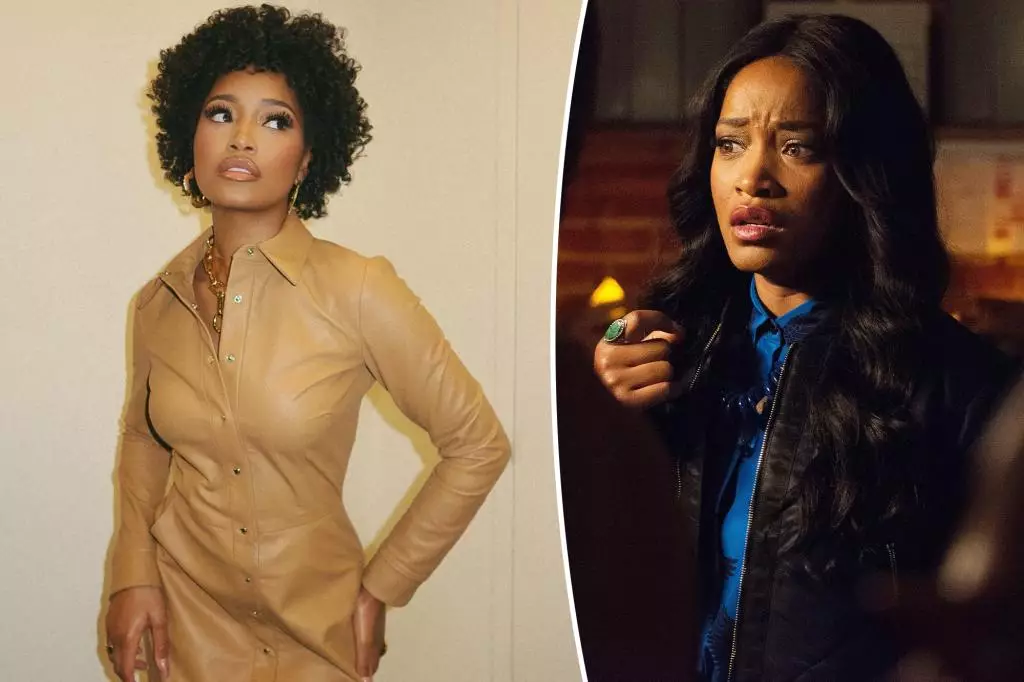In a world increasingly sensitive to issues of race and power, Keke Palmer’s recent revelations from her upcoming memoir, “Master of Me: The Secret to Controlling Your Narrative,” provide a striking glimpse into the complexities of navigating Hollywood as a Black actress. Claiming a co-star from the series “Scream Queens” made a racist taunt toward her, Palmer’s experience serves as an important commentary on racism, the significance of self-identity, and the ongoing challenges faced by marginalized voices in the entertainment industry.
The incident that Palmer describes appears to center around a clash between her co-star, referred to as “Brenda,” and another colleague. When Palmer attempted to mediate the situation by encouraging professionalism and mutual respect, she was met with a demeaning retort that invoked the legacy of civil rights icon Martin Luther King Jr. This reaction underscores not just an individual’s anger, but a deeper cultural response—a unwillingness to engage with the complexities of race and respect within a high-pressure workplace.
Palmer’s decision to not reveal her co-star’s identity speaks volumes about her understanding of the narrative. By choosing to keep “Brenda” nameless, she aims to strip the statement of its power, illustrating her refusal to be categorized as a victim. This resonates powerfully with readers, as it portrays a woman who is aware of her strengths and refuses to be defined by another’s prejudiced comments. In her interview, she articulates, “I’m not no victim. That’s not my storyline, sweetie,” which is not just a personal assertion but a rallying cry for many who have faced similar situations of racial denigration.
Immediately following the publication of her interview, social media erupted with speculation regarding the identity of “Brenda.” Observing the back-and-forth among fans brought to light the sometimes toxic nature of online discourse, particularly regarding racial injustices. While some suggest Lea Michele may be the guilty party, this underscores another issue—why, in a modern context, does the amplification of a single story often devolve into gossip rather than constructive conversation? The focus shifts from addressing systemic racism to identifying individuals, which can further complicate personal narratives for all involved.
This also raises critical questions surrounding accountability and collective responsibility. Rather than trivializing racial confrontations to mere fodder for gossip, a more profound dialogue on the implications of racism in the workplace is far more beneficial.
Complementing her tales of racism, Palmer reflects on an incident involving Ryan Murphy—an industry titan—who reportedly expressed disappointment when she took a day off to manage another engagement. This reaction from Murphy embodies the often-destructive nature of power dynamics in Hollywood, where an actor’s well-being can feel secondary to the demands of a production. Palmer’s anecdote reveals her recognition of her own brand as essential to the equation. It isn’t merely a fight for respect on set, but an assertion of her rights as a professional.
The juxtaposition of Murphy’s authority and Palmer’s quest for self-advocacy paints a broader picture of Hollywood’s balance of power, highlighting the often-unspoken tension between being a talented artist and maintaining one’s personal boundaries. When Palmer articulates that Murphy was “centering his business,” she subtly reminds readers—and perhaps him—that she, too, is a business.
As Palmer’s memoir is set to become a source of empowerment for many, her story resonates beyond her personal experiences. It is a clarion call to recognize individual narratives within the overarching framework of systemic issues like racism and exploitation in the entertainment industry. By addressing her encounters candidly, Palmer not only takes control of her narrative but also inspires others to do the same. As the publication date approaches, readers will hopefully engage not just with Palmer’s words, but with the larger conversations they herald about race, respect, and the ongoing evolution of Hollywood. This is not merely about her experience; this is a collective rise toward greater awareness and change.

